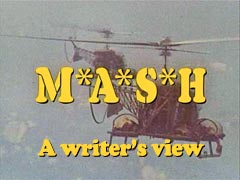My own serial in (occasional) progress, which I depreciatingly call ‘the Orchard of Dis-Pear’ and hope to resume work on some time soon, was actually inspired partly by my revisiting of M*A*S*H. It was the idea of the three double acts that sired Where Angels Die upon my imagination; though my serial will have, I imagine, nothing like the felicity and depth of humour that M*A*S*H had. We cannot all be Larry Gelbart, but we can at least be ourselves.
In Where Angels Die, the three double acts are (1) the two paladin/exorcists, Revel and the Badger; (2) Baron Vail and his steward Greyhand; (3) the chief Paladin and Angel at Angel Keep, Master Herison and Lady Swan, whom you have not yet met. They bear some resemblance to the duos of Hawkeye–Trapper, Col. Blake–Radar, and Frank–Hot Lips, but of course their stories, and the kind of stories to be written about them, are quite different.
In other news, when I simply cannot brain at all, I have occasionally been reduced to watching an episode of Gilligan’s Island: after which the grey matter rebels, and insists upon either functioning or going to sleep – either of which is an improvement. Gilligan is every bit as stupid as I recall from my childhood; it is deliberately stupid, but endearingly stupid, an art form that has since been lost and may well remain so. I could say that Gilligan’s Island is the dumb blonde of American sitcoms. However, it has redeeming points – chiefly in the fine comic performances of the actors, above all Bob Denver and Jim Backus – and two areas of genuine excellence. For one, it was a fertile vehicle for parody; in its three-year run, the show did sendups of every genre of film and popular fiction under the sun, from Westerns and monster movies to Hamlet and The Count of Monte Cristo. For another, the incidental music was far superior to the show itself; it was only on this latest revisit that I fully appreciated just how good the score was (excluding the idiotic theme song, which was composed by another hand). From the credits, I discovered that the score was written by an up-and-coming young composer named Johnny Williams.
Yes, that John Williams. This may be old news to everybody else, but my mind was sufficiently boggled; and somehow I find myself fonder of Williams than I was before.









Recent Comments